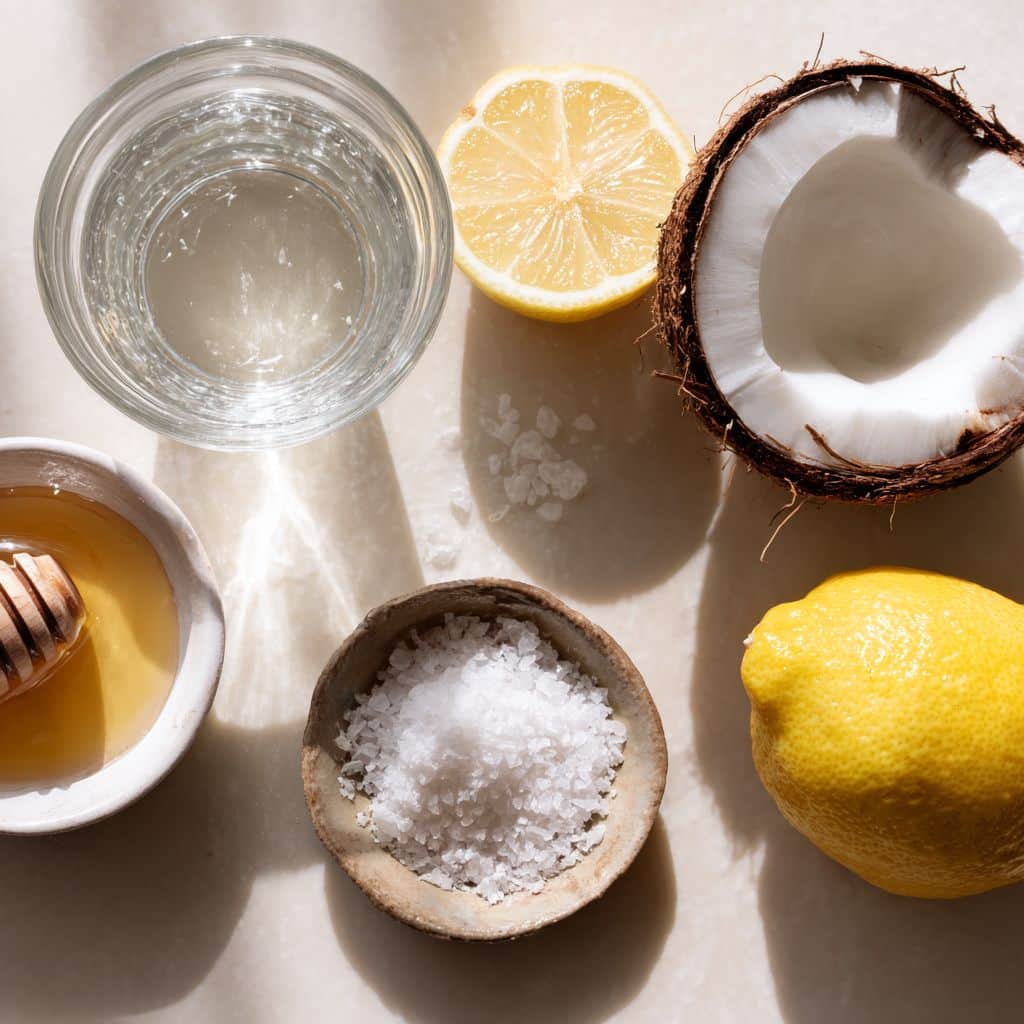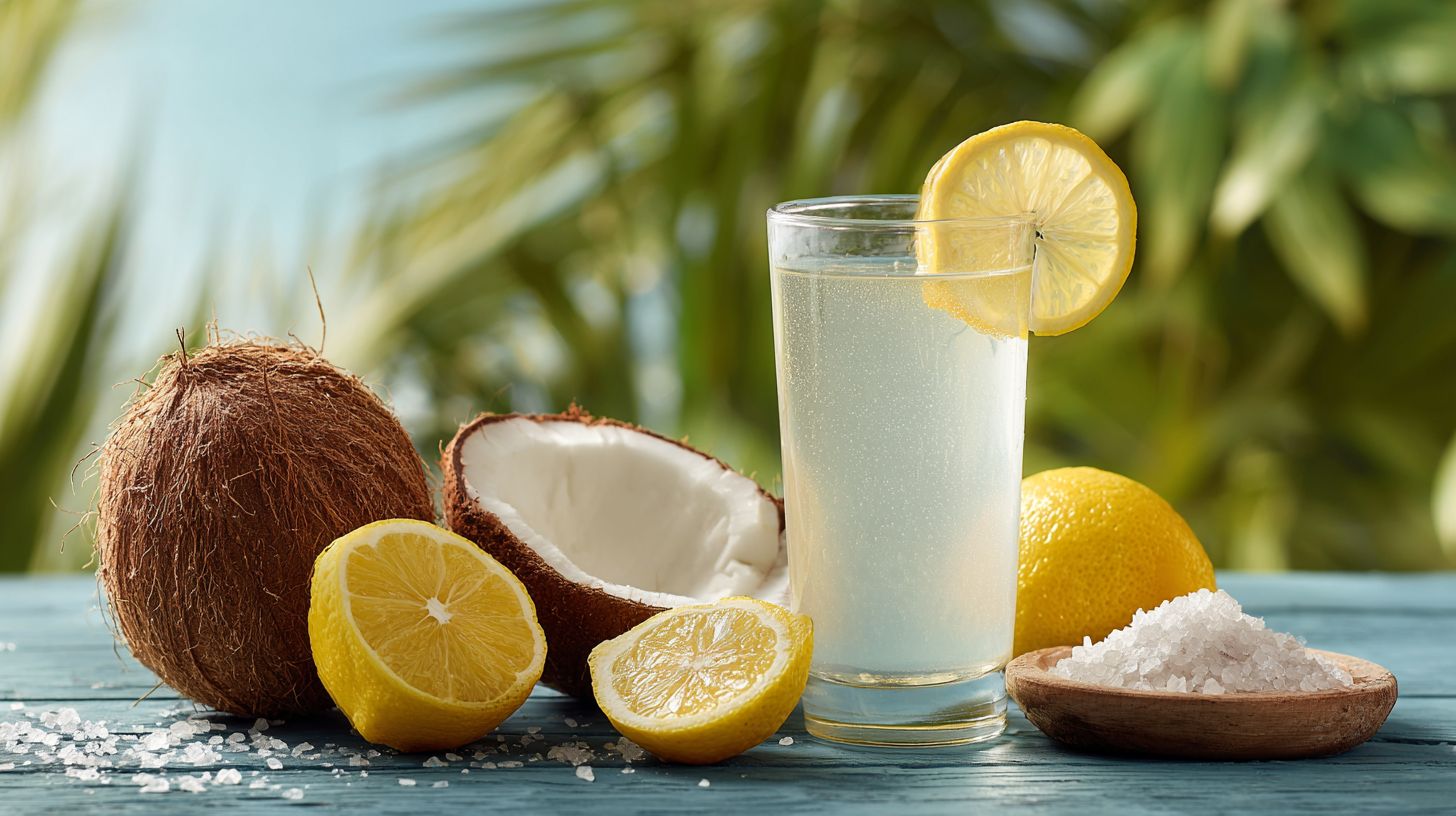Homemade electrolyte drink coconut water blends have become a go-to for people seeking a natural way to recover after exercise, heat, or illness. Sarah was halfway through her summer morning run when the heat hit her hard. By the time she got home, her legs felt heavy, her mouth was dry, and water alone didn’t cut it.
She remembered a simple recipe: coconut water, a pinch of sea salt, and lemon juice. That homemade electrolyte drink coconut water mix not only helped her recover but became part of her routine. And she’s not alone. More people are now skipping artificial sports drinks for DIY solutions that are clean, affordable, and quick to make.
In this guide, you’ll learn why coconut water works as an electrolyte base, how to make your own recipe, and when to drink it for best results.
Table of Contents
Benefits of Homemade Electrolyte Drink Coconut Water
Nutritional Value of Coconut Water
Coconut water is naturally rich in several essential electrolytes that help your body retain fluids and regulate muscle function. A single cup (240 ml) of fresh coconut water contains:| Nutrient | Amount |
|---|---|
| Potassium | 600 mg |
| Sodium | 40–60 mg |
| Magnesium | 60 mg |
| Calcium | 50–60 mg |
These minerals support everything from heart rhythm to hydration. Since coconut water is low in calories and sugar compared to processed drinks, it’s especially appealing for daily use.
Why Coconut Water Is Naturally Hydrating
Coconut water contains the perfect balance of natural sugars, electrolytes, and water. This makes it highly absorbable, especially during physical activity or after mild dehydration.
Unlike sodas or sugary sports drinks, coconut water provides energy without spiking blood sugar. This makes it ideal as the base for a homemade electrolyte drink. It’s also a good source of antioxidants that may help reduce oxidative stress after exercise.
Another bonus? It’s a natural isotonic beverage. That means its osmolarity (concentration of particles in liquid) is close to that of human blood, so it hydrates efficiently.
Coming up next, we’ll look at how to make your own homemade electrolyte drink coconut water at home—with ingredients you probably already have.
How to Make a Homemade Electrolyte Drink Coconut Water
Key Ingredients You Need at Home
Creating your own homemade electrolyte drink coconut water blend doesn’t require a complicated list. Most ingredients are pantry staples, and the result is both effective and clean. Here’s what you’ll need:

Homemade Electrolyte Drink Coconut Water: Can You Really Rely on It for Rehydration?
Ingredients
Method
- 1. Combine coconut water and filtered water in a bottle.
- 2. Add lemon juice and sea salt.
- 3. Stir or shake well until salt dissolves.
- 4. Mix in honey, if desired.
- 5. Serve chilled or over ice.
Nutrition
Notes
Tried this recipe?
Let us know how it was!- Coconut Water (1 cup): Your base and primary electrolyte source. Look for unsweetened, 100% coconut water.
- Sea Salt (⅛ tsp): A pinch of natural salt provides essential sodium and chloride.
- Fresh Lemon or Lime Juice (2 tbsp): Adds flavor and vitamin C.
- Honey or Maple Syrup (1–2 tsp): Optional, but helpful for quick energy and better taste.
- Filtered Water (½ cup): Lightens the mix and improves absorption.

Each ingredient serves a purpose. Coconut water delivers potassium and magnesium. Salt restores sodium lost through sweat. Lemon juice boosts your immune system and gives the drink a refreshing edge.
Easy Step-by-Step Recipe Anyone Can Follow
Once the ingredients are ready, follow these simple instructions:
- Combine 1 cup coconut water and ½ cup filtered water in a glass or bottle.
- Squeeze in 2 tablespoons of fresh lemon or lime juice.
- Add ⅛ teaspoon of sea salt.
- Stir in 1 to 2 teaspoons of honey or maple syrup if preferred.
- Mix well until all ingredients dissolve fully.
- Chill or serve immediately over ice.
This drink is best consumed within 24 hours for maximum freshness. Keep it stored in a clean, sealed bottle in the refrigerator.
Here’s a quick reference:
| Ingredient | Purpose |
|---|---|
| Coconut Water | Hydration and electrolytes |
| Sea Salt | Sodium and chloride balance |
| Lemon Juice | Flavor and vitamin C |
| Honey | Energy boost (optional) |
You now have a drink that replaces key electrolytes without synthetic dyes, chemicals, or high-fructose corn syrup. It works before, during, or after a workout or just to feel refreshed on a hot day.
Is a homemade electrolyte drink coconut water Good Enough for Athletes?
Why Some Athletes Avoid Coconut Water
Coconut water is praised for its natural composition, but some athletes are hesitant to use it during intense training. The main reason? Sodium levels. While coconut water is high in potassium, its sodium content is significantly lower than what endurance athletes lose through sweat.
To put it into perspective:
| Drink Type | Sodium per 8 oz |
|---|---|
| Coconut Water | 40–60 mg |
| Sports Drink (e.g., Gatorade) | 150–250 mg |
For a runner in hot weather or someone doing high-intensity cardio, that sodium gap can lead to cramps, dizziness, or slower recovery. This is why elite athletes often prefer custom electrolyte mixes with higher sodium levels.
However, that doesn’t mean coconut water is useless for performance. It works well for light to moderate activity, especially when paired with sea salt or sodium-rich snacks.
Comparing Coconut Water with Commercial Sports Drinks
Let’s break down the biggest differences between coconut water and commercial options:
| Factor | Coconut Water | Sports Drink |
|---|---|---|
| Electrolytes | High potassium, low sodium | Balanced sodium and potassium |
| Sugar Content | Natural sugars only (6–9g per cup) | Often added sugars (20g or more) |
| Additives | None if pure | Artificial flavors, colors |
| Calories | ~45–60 per cup | 80–140 per bottle |
| Best Use | Light workouts, casual hydration | Endurance training, long-distance events |
If you’re working out for under an hour or looking to rehydrate after yoga, a homemade electrolyte drink with coconut water is perfect. For intense workouts, consider adding a pinch more salt or pairing with a small salted snack to balance sodium levels.
Best Times to Drink Homemade Coconut Water Electrolyte Drinks
Should You Drink It on an Empty Stomach?
There’s a common belief that drinking coconut water first thing in the morning boosts hydration. While it’s mostly true, some people may experience discomfort if they consume it on an empty stomach.
Coconut water is mildly acidic and rich in potassium. For those with sensitive stomachs or low blood pressure, it can cause mild nausea or bloating when consumed alone, especially early in the day. If that’s the case, try drinking it after a light breakfast or pairing it with a banana.
However, most healthy adults can safely drink a homemade electrolyte drink with coconut water in the morning. Just avoid overdoing it stick to one glass and watch how your body responds.
When to Use It for Exercise or Recovery
Timing your electrolyte intake makes a big difference. Here’s when your coconut water blend works best:
- Before exercise (20–30 minutes): Prepares the body by restoring mineral balance and supporting hydration.
- During light workouts: If you sweat moderately, sip throughout your session to replace lost fluids.
- Post-workout (within 30 minutes): Replenishes electrolytes, helps with muscle recovery, and reduces the chance of cramps.
- Hot weather or illness recovery: Useful when recovering from heat exhaustion, a cold, or stomach flu, thanks to its gentle nature.
This drink is also a great choice after a night of poor sleep, long travel, or mild dehydration caused by coffee or alcohol. It helps bring your system back into balance without artificial ingredients.
Next, let’s look at recipe variations that add flavor, nutrients, or make the drink kid-friendly.
Variations of Coconut Water Electrolyte Recipes
Kid-Friendly and Low-Sugar Versions
Kids often resist plain coconut water due to its earthy taste. But with small changes, it becomes more appealing and suitable for young athletes or active children.
Try these simple, low-sugar versions:
- Coconut Water + Orange Juice: Mix ½ cup coconut water with ½ cup freshly squeezed orange juice. Add a pinch of salt. The orange flavor masks the taste and adds vitamin C.
- Berry Coconut Cooler: Blend ¾ cup coconut water with a handful of frozen strawberries or blueberries. Add a teaspoon of honey if needed.
- Melon Electrolyte Mix: Combine ½ cup coconut water with ½ cup pureed watermelon. Add a dash of lime juice and a tiny pinch of sea salt.
For each version, keep total sugar below 10 grams per serving when possible. Avoid commercial juices with added sweeteners, especially for children.
Additions for Extra Minerals and Taste
If you want to boost the mineral content or flavor, there are several healthy additions you can mix into your homemade electrolyte drink coconut water:
| Add-In | Benefit |
|---|---|
| Chia seeds (1 tsp) | Adds omega-3s, fiber, and slows sugar absorption |
| Magnesium drops | Increases magnesium for muscle support |
| Cucumber slices | Adds freshness and natural potassium |
| Mint leaves | Improves taste and digestion |
| Aloe vera juice (1 tbsp) | Soothes the stomach and supports hydration |
These extras help you adjust the recipe based on your needs whether it’s better recovery, more minerals, or simply better flavor.
You can even batch prepare different versions in glass jars, label them, and store in the fridge for quick access all week.
Next, we’ll cover safety tips and how long your homemade drink will last.

Safety Tips and Storage for homemade electrolyte drink coconut water
How Long Can You Store It in the Fridge?
Since your homemade electrolyte drink coconut water has no preservatives, proper storage is essential. Always keep it in an airtight glass bottle or jar. When stored in the refrigerator, it stays fresh for up to 48 hours.
After that, the flavor may change, and nutrients can begin to degrade. For best results:
- Label each bottle with the date you made it.
- Keep it cold (below 40°F or 4°C).
- Avoid temperature swings—don’t leave it out, then put it back.
If you’re prepping a larger batch, consider storing it in smaller single-serve bottles. That way, you open only what you need.
Signs It’s Gone Bad and When to Toss It
Even if it’s stored well, homemade drinks can spoil. Here are clear signs your mix should be discarded:
- Sour or off smell: Fresh coconut water has a mild, slightly sweet aroma.
- Separation or slimy texture: A little pulp is normal, but if you see thick layers or a cloudy look, toss it.
- Fizzing or bubbles: Indicates fermentation.
- Taste is sharp or unusual: If it burns or feels carbonated, don’t drink it.
To stay safe, never store your drink longer than two days especially if it includes fruit juice or added ingredients like chia seeds.
Now that you know how to make and store your drink safely, let’s move to the FAQ section, answering common questions people search for online.
FAQ Section
Can I drink coconut water for electrolytes?
Yes. Coconut water is a natural source of potassium, magnesium, calcium, and small amounts of sodium. These minerals help restore electrolyte balance after sweating or mild dehydration. It works well for daily hydration or after light physical activity.
How do you make a homemade electrolyte drink?
You can mix 1 cup coconut water, ½ cup filtered water, 2 tablespoons lemon juice, ⅛ teaspoon sea salt, and 1–2 teaspoons of honey. Stir well and serve chilled. This blend replaces lost fluids and minerals without processed sugar or additives.
Why don’t athletes drink coconut water?
Some athletes avoid coconut water because it lacks enough sodium, which is lost in large amounts during intense workouts. While it offers high potassium, it may not provide the full electrolyte support needed for endurance training unless sodium is added.
Why should we not drink coconut water in an empty stomach?
Some people experience bloating or mild discomfort when drinking coconut water on an empty stomach. Its high potassium content and acidity may trigger nausea in sensitive individuals. It’s best consumed after a light meal or as part of a snack.
Conclusion
A homemade electrolyte drink coconut water recipe offers a clean, effective way to stay hydrated. With just a few simple ingredients, you can support your body’s natural fluid balance whether you’re recovering from a workout, a hot day, or a mild illness.
Unlike commercial drinks, this homemade version skips the excess sugar and preservatives. Just remember to balance coconut water with added sodium when needed and always store it properly.
Try making a batch today and see how your body responds. You may never go back to store-bought again.

